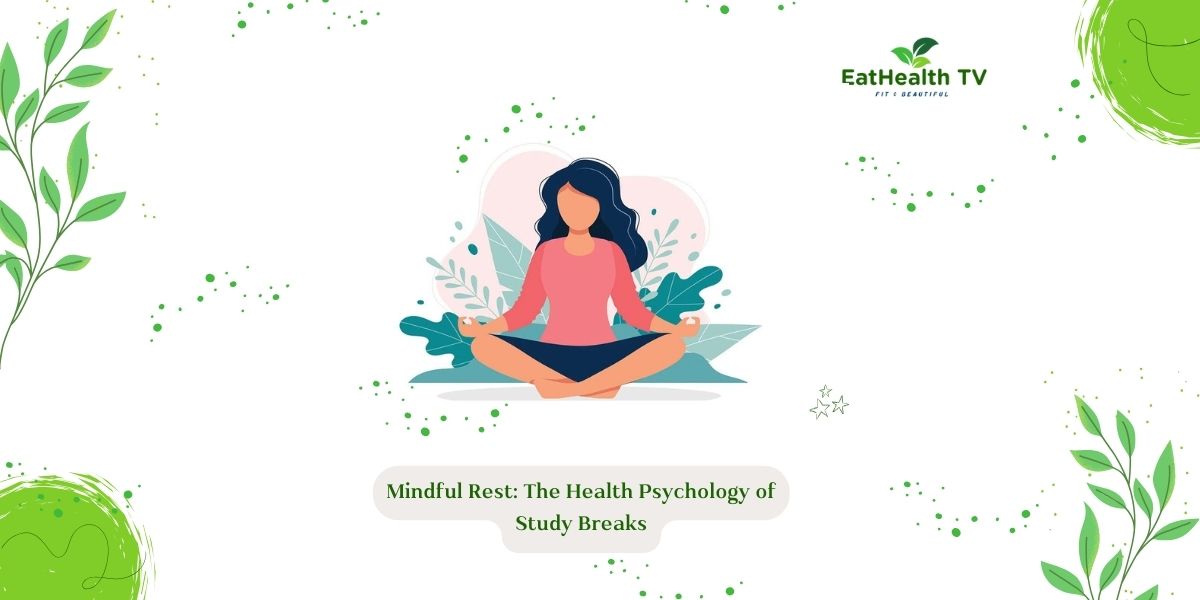Mindful Rest: The Health Psychology of Study Breaks
Elevate Your Study Game: Harnessing the Power of Mindful Rest

Mindful Rest: The Health Psychology of Study Breaks
In the pursuit of academic success, students often find themselves immersed in long hours of studying, with little time for rest or relaxation. However, research in health psychology highlights the importance of incorporating mindful rest and study breaks into one’s study routine. In this article, we delve into the concept of mindful rest, exploring the psychological and physiological benefits of study breaks, and offering practical strategies for incorporating restorative practices into daily study habits.
Understanding Mindful Rest
Mindful rest refers to the intentional practice of taking breaks during study or work sessions to rest, recharge, and rejuvenate the mind and body. It involves stepping away from academic tasks temporarily, engaging in activities that promote relaxation and stress reduction, and returning to study with renewed focus and energy. Mindful rest is not merely idleness; it’s a deliberate pause in productivity designed to optimize cognitive function, enhance well-being, and prevent burnout.
The Health Psychology of Study Breaks
Several principles from health psychology shed light on the importance of study breaks for mental and physical health: Just as we know Types of Breathing Exercises are Stress Relief
- Stress Reduction: Prolonged periods of intense studying can lead to elevated stress levels, which negatively impact cognitive function, mood, and overall well-being. Taking regular study breaks allows the body’s stress response system to reset, reducing cortisol levels and promoting relaxation and mental clarity.
- Enhanced Cognitive Function: The brain operates most efficiently when given opportunities for rest and recovery. Study breaks help prevent cognitive fatigue and maintain optimal cognitive function, allowing students to sustain attention, retain information, and engage in higher-order thinking skills effectively.
- Improved Memory Consolidation: Research suggests that the brain consolidates and integrates new information during periods of rest, particularly during sleep. Taking breaks between study sessions allows the brain to process and encode information more effectively, leading to improved memory retention and recall.
- Enhanced Creativity and Problem-Solving: Mindful rest stimulates divergent thinking and creative problem-solving abilities. Stepping away from academic tasks and engaging in activities such as walking, doodling, or daydreaming can foster insight, inspiration, and novel solutions to complex problems.
- Physical Health Benefits: Prolonged sitting and sedentary behavior have been linked to various health risks, including obesity, cardiovascular disease, and musculoskeletal issues. Taking study breaks provides opportunities for physical movement, stretching, and relaxation, reducing the negative effects of prolonged sitting and promoting overall physical health and well-being.
Strategies for Incorporating Mindful Rest into Study Habits
To incorporate mindful rest into their study routines, students can consider the following strategies:
- Implement the Pomodoro Technique: The Pomodoro Technique involves breaking study sessions into intervals of focused work (typically 25 minutes) followed by short breaks (5 minutes). After completing four work intervals, take a longer break (15-30 minutes) to rest and recharge before resuming studying.
- Engage in Physical Activity: Incorporate physical activity into study breaks to promote blood flow, reduce muscle tension, and boost energy levels. Take a short walk, do some stretching exercises, or practice yoga to refresh the body and mind.
- Practice Mindfulness Meditation: Spend a few minutes practicing mindfulness meditation during study breaks to calm the mind, reduce stress, and enhance focus. Focus on your breath, body sensations, or a guided meditation to cultivate present-moment awareness and mental clarity.
- Connect with Nature: Spend time outdoors during study breaks to connect with nature and promote relaxation. Take a stroll in the park, sit under a tree, or simply gaze at the sky to experience the restorative benefits of nature.
- Engage in Creative Activities: Use study breaks as an opportunity to engage in creative activities that stimulate the imagination and promote relaxation. Doodle, write in a journal, listen to music, or engage in artistic pursuits to tap into your creative side and alleviate mental fatigue.
- Practice Deep Breathing Exercises: Incorporate deep breathing exercises into study breaks to reduce stress, calm the nervous system, and promote relaxation. Take slow, deep breaths in through the nose and out through the mouth to activate the body’s relaxation response.
- Socialize and Connect: Use study breaks to socialize and connect with friends, family, or classmates. Engaging in brief conversations or connecting with others through social media can provide a welcome distraction and boost mood and morale.
Benefits of Mindful Rest
Incorporating mindful rest into study habits offers numerous benefits for students:
- Improved Academic Performance: Taking regular study breaks enhances cognitive function, memory retention, and concentration, leading to improved academic performance and productivity.
- Enhanced Well-Being: Mindful rest promotes relaxation, stress reduction, and emotional well-being, fostering a positive mindset and resilience in the face of academic challenges.
- Increased Creativity and Productivity: Study breaks stimulate creativity, problem-solving abilities, and productivity, enabling students to approach academic tasks with fresh perspectives and renewed energy.
- Prevention of Burnout: Mindful rest helps prevent burnout and mental exhaustion by allowing students to recharge and replenish their mental and physical resources regularly.
- Promotion of Healthy Habits: Incorporating mindful rest into study habits encourages the adoption of healthy lifestyle habits, such as regular physical activity, stress management techniques, and self-care practices, which contribute to long-term well-being.
Conclusion
Mindful rest is an essential component of effective study habits, promoting mental clarity, well-being, and academic success. By incorporating study breaks into their routines and prioritizing restorative activities, students can optimize cognitive function, enhance learning outcomes, and cultivate a healthy balance between academic pursuits and personal well-being. As we continue to explore the intersection of health psychology and education, let us embrace mindful rest as a pathway to holistic learning, growth, and fulfillment.




